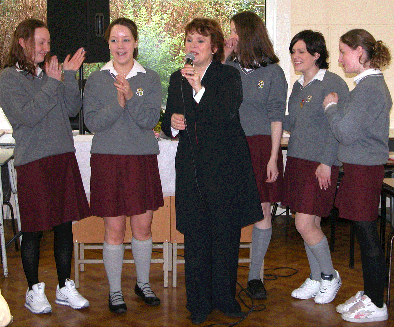|
Dana Rosemary
Scallon Visits Mount Saint Michael

Today, January 19th 2004, M.E.P. Dana Rosemary
Scallon came to Mount Saint Michael to discuss with us the inner
workings of the European Parliament and many important issues
faced by the Union today. Dana herself was Mercy educated and
upon arrival confessed a great 'grá' for all Mercy schools.
As you know, perhaps, Dana was elected in 1999 as M.E.P. for
the Ulster- Connaught constituency. Under that umbrella are the
counties Mayo, Galway, Sligo, Leitrim, Roscommon, Cavan, Donegal
and Monaghan. Her talk to the school was of particular interest
to those of us in Transition year, as tomorrow we will be travelling
to Strasbourg, to visit the European Parliament as part of the
Euroscola programme. While there we will be discussing issues
such as Europe and environment, economic and social priorities
within the E.U., the place of European values such as peace,
security, justice and human rights in the world today and the
future of Europe. As you can see there won't be any idle chit-
chat!
Dana began by explaining to us how the European Union works.
Each institution was described in detail from the most powerful
body, The Council, right down to the Court of Justice. We were
told about the various groups within the parliament such as the
Liberals and the Socialist group and of course the European Peoples
Party, which is the largest and the one which Dana herself is
a member. After being elected and joining a group, M.E.P.'s then
have to decide what committee they would like to sit on. Dana
explained why she thought the committees she is on, The Committee
for Youth, Education, Culture, Media and Sport and The Committee
for Regional Development, Transport and Tourism are of particular
importance to the West of Ireland. "Regional Development",
she said, "was vital in order to ensure jobs for those who
have to move away from the decreasing farming industry in the
West".
She then took a step back in time by telling
us how the great European project that is the Union was founded.
In 1950 shortly after World war 2, Germany and France strove
to find a better way to live other than fighting. Instead of
opposing one another in military ways they joined forces and
created economic ties based on the trading of coal and steel.
This union then attracted smaller countries to join on the promise
of equality with the larger countries. This would be insured
partly by the power of the veto. On the world stage the U.S.A
helped the union politically and economically in the form of
a £15 million investment.
Mrs Scallon then took questions from the floor.
When asked whether she agreed with the continual move of the
presidency every six months, she replied saying it was both good
and bad. Small countries are given a chance to highlight what
issues are important to them. As politics change so rapidly perhaps
it is better that the presidency changes with them offering a
new prospective. She also cited the great energy and freshness
that came with a new President as a reason for change. However
she did add that the present system lacked continuity and that
certain issues may be dropped, so to speak, during each change.
When someone suggested the fact that we may indeed have one President
if the Commission was made the official European Government,
Dana stated that she was opposed to this idea. She made the point
that the Union has no power of its own- only what we, the member
states, give it. By giving it its own Government we are making
the Union a legal body and taking away the decision making from
the people while leaving the new Government unaccountable to
voters. We already have our own President, Mrs Scallon said,
and the democratic process must be protected. Big or small everyone
must be heard and everyone must have an input. It is our Union.
The question of Irish neutrality was then
raised. Dana quickly reinforced the idea that we should have
the right to remain neutral, it should not be dictated to us.
Our right to remain neutral is part of our constitution. She
then went on to say that a very important issue at the moment
in Europe is the proposal of a new constitution. The debate on
this matter has failed to reach agreement. One of the main points
in the constitution Dana disagrees with is the fact that our
power of veto will be lost except on tax and any common defence
and security policies. The European Court of Justice will resolve
whether or not there is any conflict between our Constitution
and the European Constitution.
After the discussion of such major issues,
the floor seemed to re-direct its attention to lighter subjects.
"How does a M.E.P. spend her week?" one person asked.
Dana tries to balance her week between Brussels, her constituency
and her family- a genuine 'superwoman' it would seem! She reassured
us though it's all about division of her time efficiently. Three
days out of the five working are spent in Brussels. The remaining
two is then spent with her constituents. On Saturdays she divides
her time between her family and any function she may have to
attend. Sunday remains purely a family day.
What made the biggest impression on me, personally,
were her reasons for getting involved in politics. She maintains
she did not run for parliament to win, but to make things better.
Growing up in the north she had little faith in politics until
she realised that she had to be actively involved to make a difference.
She saw what was wrong and wanted to help. One of her great lines
of the day was her description of politics-
"Care of the People". What struck me about her talk
today was the fact that I truly believed she cared an awful lot.
Sinead Egan.
Transition year.
|